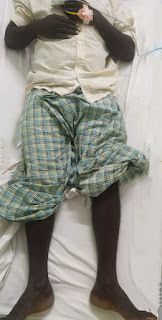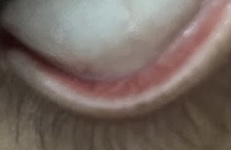Case of 65 years old male with right hemiparesis
This is an online E-Log book to discuss our patient's de-identified data shared after taking his/her/Guardian's signed informed consent. Here, we discuss our individual patient's problems through series of inputs from available global online community of experts with an aim to solve these patient's clinical problems with collective current best evidence-based inputs. This E-log also reflects my patient-centered online learning portfolio and your valuable inputs in the comment box are welcome.
CASE:
A 65 YEARS OLD MALE came to the OPD with:
CHIEF COMPLAINTS:
- Difficulty in lifting right upper limb and lower limb since 3days.
- Deviation of angle of mouth towards right since 3days.
- Difficulty in swallowing liquids and solids since 3 days.
HISTORY OF PRESENT ILLNESS:
Patient was apparently asymptomatic 7 years ago then he had dinner around 8pm and slept, at 2pm he woke up to pass urine he suddenly fell in the bathroom following which he had right side hemiparesis for which he went to a private hospital and was diagnosed with CVA and HYPERTENSION, given medication and discharged.
The patient took ?medications for 1year and stopped taking them, took physiotherapy for 1 month it took 3months to walk but did not recover completely and since then uses cane to walk.
The patient was started on ANTI HYPERTENSIVES ? which he used for one year.
No slurring of speech during this episode.
No loss of consciousness.
Later he took his medications on and off till 1 year ago since then he completed stopped taking medication.
On 6/02/2022,
Patient went to use washroom around 5am and was not able to get up after passing urine.
Slurring of speech was present,Deviation of angle of mouth towards right,
Dysphagia, right side hemiparesis.
He was taken to a private hospital andwas admitted there for three days, took an CT BRAIN impression:
- Ill-defined patchy hypodensity in left body of caudate nucleus and left corona radiata - ?subacute to chronic infarct.
- Chronic lacunar infarcts in bilateral capusloganglionic regions and bilateral corona radiata.
- Diffuse cerebral atrophy.
- Chronic small vessel ischemic changes.
Then was referred here for further treatment.
PAST HISTORY:
No h/o similar episodes in past.
Not a k/c/o DM, TB, Asthma, Epilepsy.
PERSONAL HISTORY:
DAILY ROUTINE before illness:
- 5am- wakes up and get ready
- 7am- Tea
- 10am- breakfast
- 12pm- goes to work (goatherd)
- 6pm- come back home and cleans up
- 8pm- dinner
- 9pm- sleeps
after illness: patient has the same routine as before, but has difficulty in walking.
- Diet- Mixed
- Appetite- Normal
- Bowel- regular, passed stools 3 days ago ; bladder movements- Regular.
- Sleep- Adequate
- Addictions- H/o alcohol consumption 90ml/day for 20years 7 years ago ,since then consumes occasionally.
- Surgical history- Cataract surgery in both eyes 8 years ago
FAMILY HISTORY:
Insignificant
GENERAL EXAMINATION:
The patient was examined in a well-lit room after informed consent was taken.
He is conscious, coherent, cooperative, well oriented to time, place and person. He was well nourished and moderately built.
No Pallor, Icterus, Clubbing, Cyanosis, Koilonychia, Lymphadenopathy, Edema.
VITALS:
- PR: 92bpm
- RR: 22cpm
- BP: 110/90 mmHg
- Temperature: 99°F
- GRBS: 94mgdL
- SpO2: 95% on room air.
SYSTEMIC EXAMINATION:
CNS:
HIGHER MENTAL FUNCTIONS:
- Oriented to time,place,person
- Memory : immediate,recent, remote intact
- Speech: slurred
- No delusions or hallucinations
CRANIAL NERVES:
1- not tested
2- counting fingers+
3,4,6- No restriction of movement of eye
5-normal( muscles of mastication+sensations of face)
7-deviation of Angle of mouth to right side.
8- Normal hearing
9,10-difficulty in swallowing and slurred speech, gag reflex not tested
11,12- normal.
MOTOR EXAMINATION:
TONE: Increased in right upper and lower limbs and normal in left upper and lower limbs
POWER : Right Left
Upper limb 4/5 4/5
Lower limb 3/5 4/5
Reflexes : Right Left
- Biceps: 3+ 2+
- Triceps: 3+ 2+
- Supinator: 3+ 2+
- Knee: 3+ 2+
- Ankle: - -
Plantars: extensor Flexor
SENSORY EXAMINATION:
Could not elicit.
CEREBELLUM EXAMINATION:
- Able to do finger nose test.
- No dysdiadokinesia
- No rebound tenderness
- Gait: couldn't walk , CIRCUMDUCTION PATTERN (as patient's attenders described)
AUTONOMIC NERVOUS SYSTEM:
- No abnormal sweating
- No resting tachycardia
MENINGEAL SIGNS: Absent
CVS: S1 and S2 heard.
RS: BAE+ NVBS+
Per Abdomen:
Soft, non tender, no distension, umbilicus is central and inverted,no scars, no sinuses.
INVESTIGATIONS:
HEMOGRAM
- Hb- 15.4g%
- TLC- 8,700 cells/cc
- Neutrophils-78
- Lymphocytes- 12
- Eosinophils-2
- Monocytes-8
- Basophils-0
- PCV-43.7
- MCV- 37.8
- MCH-30.9
- MCHC-35.2
- RDW-CV- 13
- RDW-SD- 42.5
- RBC- 4.98m/cc
- Platelets- 2.18lakh
- PS- NORMOCYTIC NORMOCHROMIC
LFT
- TB- 2.11
- DB- 0.94
- AST- 41
- ALT- 26
- ALP- 98
- TP- 7.4
- ALB- 3.83
- A/G- 1.07
RFT
- Serum urea- 22
- Serum creatinine- 1.1
- Na+: 135
- K+: 4.1
- Cl- 98
SEROLOGY
- HIV- NEGATIVE
- HBsAg- NEGATIVE
- HCV- NEGATIVE
ECG
COLOUR DOPPLER 2D ECHO
CAROTID DOPPLER








Comments
Post a Comment